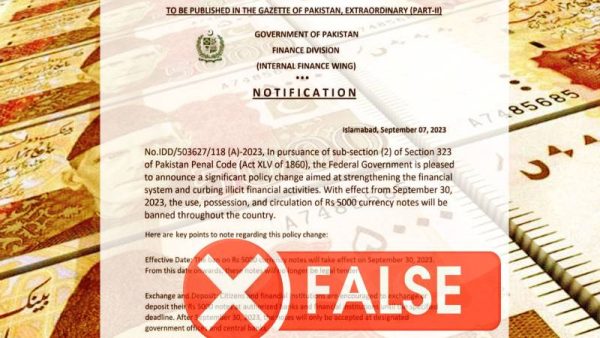
Fake news spreads like wildfire in today’s environment. An “official” circular recently went viral, stating that the Rs. 5000 note is being discontinued. However, this news turned out to be fake. The government has clarified that no such measure is being taken.
On Thursday, Pakistan’s Ministry of Information and Broadcasting (MoIB) refuted claims of an alleged ban on using, owning, and distributing Rs 5000 currency notes.
According to Geo News, this clarification came in response to a counterfeit circular bearing the Finance Division’s letterhead that had gained widespread attention on social media.
The counterfeit notice, dated September 7, 2023, falsely indicated that the government intended to ban the currency mentioned above note by the end of the current month as part of a “significant policy shift.”
Furthermore, the misleading notice urged citizens and financial institutions to exchange or deposit Rs 5000 denomination currency notes at authorized banks by the specified deadline, as these notes would lose their legal tender status afterward.
However, a fact-checking unit operating within the MoIB promptly debunked the notification and the purported impending prohibition of the mentioned currency notes, categorizing it as “false information.”
Disseminating false information constitutes a violation under the Pakistan Media Regulatory Authority (Pemra) Amendment Bill of 2023, carrying a penalty of up to Rs. 10 million in fines.
How to Identify Fake News on the Internet?
Check the Source:
Verify the credibility of the website or news outlet.
Look for Authorship:
Investigate the author’s qualifications and expertise on the subject matter.
Cross-Reference:
Compare the story with information from multiple sources to confirm its accuracy.
Check the Date:
Ensure the news is current and not outdated or misleading.
Examine Photos and Videos:
Reverse image search and analyze multimedia for authenticity.
Beware of Sensationalism:
Overly emotional or dramatic language can be a red flag.
Check for Consistency:
Ensure the story aligns with known facts and doesn’t contradict itself.
Question Biases:
Be aware of political or ideological biases that may affect reporting.
Seek Expert Opinions:
Consult experts or fact-checking organizations for verification.


